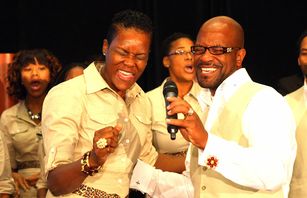CTAM Summit: Social TV Needs an OMG Experience
The smarter way to stay on top of the multichannel video marketplace. Sign up below.
You are now subscribed
Your newsletter sign-up was successful

Orlando -- It took a 10-person, all-black acappela gospel choir from the Southside Church of Christ of Orlando to drive home a message about social media to a CTAM Summit panel here Sunday.
By the end of the Oct. 14 session, titled “Moving the Needle with Social TV,” the choir sang a religious song to the melody of Stevie Wonder’s “Master Blaster” and “Isn’t She Lovely” at the request of Procter & Gamble’s Dustin Garis.
Garis, corporate innovator at P&G, had brought the choir to the session to the panel to prove a single point he pushed throughout the session: “How can TV be the gateway to people experience a richer life.”
Pushing the same tired, old marketing messages — even in the spanking-new world of social TV — simply doesn’t work, he said. “People want to live memorable lives. There’s a gap between aspirations and reality. How do we use social media to close that gap?”
Garis, showed a heart-tugging P&G TV campaign that ran during the Olympics about thanking moms, who are the biggest buyers of P&G products. He said the commercial was a spark to a broader conversation. The company then developed specific unique social-TV apps that allowed people to thank their moms.
He said marketers today need to find richer ways to enhance people’s lives, and close the gap between what people “would do” and what people “could do.” The gap, he said, is a term he calls “life profit.”
Programmers (and distributors) need to find a way to break through the increasing volume of noise and chatter in the social media ecosystem, in part because the space is becoming more crowded. The compound annual growth rate for social media activity is 275%, averaging 18% growth a month for social TV activity, according to Meghann Sills Elrhoul, a vice president of client services and analytics at Trendrr.
The smarter way to stay on top of the multichannel video marketplace. Sign up below.
Despite that growth, social-media platforms still lack a mass user base that is attractive to advertisers, so focusing on one distinct driver will make more of difference, panelists agreed.
When asked if campaigns work best during a show or in between, Elrhoul pointed out that, for example, 73% of the conversation for The CW’s Vampire Diaries happened during the show.
The panelists disagreed over whether social media drives tune in to shows; Sean Besser, executive vice president of business development for GetGlue, said his research showed 17% of viewers tuned into the show because of social buzz. “As we as human beings become less social, social TV is a tremendous opportunity to reclaim that socialness in our lives.”
Brands — not just TV shows — have much to gain, Adam Naide, executive director of marketing for Cox Communications, said. He mentioned that Felix Baumgartner’s successful skydiving freefall — breaking the speed of sound, as well as records — was sponsored by Red Bull energy drink.
“This shows how brands like Red Bull can be as much of player in the space as as networks,” he said.
